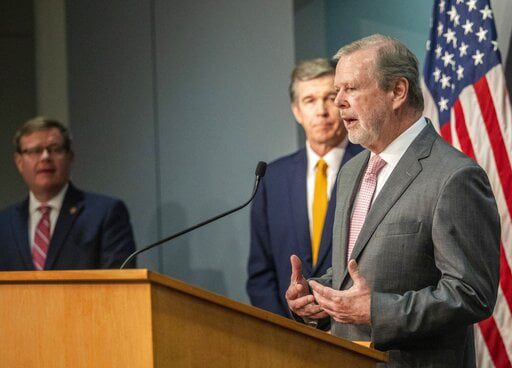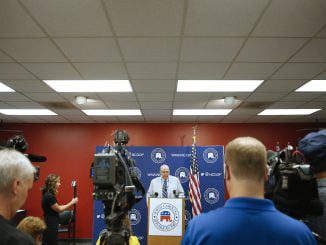
RALEIGH — The N.C. Court of Appeals has blocked the $1.7 billion Leandro funding transfer order.
Judges Christopher Dillon and Jefferson Griffin were in the majority, finding that the trial court had “erred for multiple reasons.” Judge John Arrowood dissented.
One reason involved the authority of the three agencies to transfer the funds. The agencies named in Lee’s order: the Office of the State Budget and Management, the Office of the State Comptroller, and the Office of the State Treasurer.
“First, the trial court’s interpretation of Article I would render another provision of our Constitution, where the Framers specifically provided for the appropriation of certain funds, meaningless,” wrote Dillon and Griffin. “The Framers of our Constitution dedicated an entire Article–Article IX–to education.”
The ruling then describes the specifics of funding for education in the state constitution, noting that revenue from the state can, but doesn’t have to be, appropriated to education by the legislature.
The second reason lays out the argument that Lee’s order, if fulfilled, would create ongoing problems and threaten the separation of powers between the branches of North Carolina government.
“Second, and more fundamental, the trial court’s reasoning would result in a host of ongoing constitutional appropriations, enforceable through court order, that would devastate the clear separation of powers between the Legislative and Judicial branches and threaten to wreck the carefully crafted checks and balances that are the genius of our system of government,” the ruling says.
The ruling summarizes, stating that the trial court does not have the power to compel such a transfer.
“Simply put, the trial court’s conclusion that it may order petitioner to pay unappropriated funds from the State Treasury is constitutionally impermissible and beyond the power of the trial court,” the ruling states.
While the transfer by the entities in the order may be blocked by the ruling, Dillon and Griffin noted that “Our issuance of this writ of prohibition does not impact the trial court’s finding that these funds are necessary, and that portion of the judgment remains.”
The majority opinion judges state that it is up to the “legislative and executive branches” to act and if those branches ignore it, then “the remedy lies not with the courts, but at the ballot box.”
“The people of North Carolina through their elected legislators, not an unelected county-level trial judge, decide how to spend tax dollars,” said Senate Leader Phil Berger (R-Eden) in a statement. “Rather than accepting responsibility for lagging achievement and outright failure, the Leandro parties insist that the pathway to student improvement is always the simple application of more money.”
“Judge Lee, education special interests, and the Cooper Administration hatched this unconstitutional scheme to funnel $1.7 billion in extra money to a failed education bureaucracy; this Court has rightly called them on it,” Berger said. “The legislature will continue to follow the Constitution and advance policies that enhance opportunities for student achievement, empower parents, and fund students, not failing bureaucratic systems.”
The day before the Court of Appeals ruling two of those three named North Carolina agencies had pushed back on complying with the order Lee issued on Nov. 11, which directed the transfer of $1.7 billion to occur within 30 days.
N.C. State Controller Dr. Linda Combs filed a motion on Nov. 24 with the N.C. Court of Appeals to issue a writ of prohibition, temporary stay, and writ of supersedeas.
Combs’ motion made the argument that neither she in her capacity as controller nor her office has ever been served with any order throughout the Leandro case’s lengthy history. The motion also makes the case that the controller’s office has no jurisdiction in the matter.
“Petitioner has not been made aware of any enactment by the General Assembly which would authorize her to legally distribute funds from the Treasury to comply with the Court’s order in any amount,” the motion reads.
North State Journal reached out to the Office of Budget and Management about the transfer order but has not yet received a response.
Lee’s order sought to go around the legislature to transfer the funds in violation of the North Carolina state constitution, that states in Article V, Section 7, “No money shall be drawn from the State treasury but in consequence of appropriations made by law.”
The transfer would be mainly distributed among three entities; the Department of Public Instruction, the N.C. Department of Health and Human Services, and the UNC System.
State Treasurer Dale Folwell also issued a statement that his department is seeking outside counsel due to a conflict of interest for N.C. Attorney General Josh Stein.
“Our legal team has reviewed Judge Lee’s order, and because of the Attorney General’s conflict, we have requested and received authorization to pursue outside counsel for this matter,” Folwell’s statement reads. “In the meantime, we have asked the Attorney General’s office to pursue an extension of time to the order’s 30-day period. The Attorney General’s office has responded that they are researching the appropriate mechanism and options to do so.”
Stein had filed a support brief for the transfer ruling that House Speaker Tim Moore (R-Kings Mountain) and Senate Leader Phil Berger (R-Eden) referred to in a joint statement as an “absurd theory.”
“The only rebuttal to this clear precedent is an absurd theory developed by Attorney General Josh Stein, which argues that the Constitution, in 1868, ordered a specific funding level for the education budget in the year 2021, and that only an out-of-state consultancy called WestEd can divine the precise funding level the 1868 Constitution ordered,” wrote Moore and Berger.
On Nov. 30, on behalf of Stein, N.C. Department of Justice (NCDOJ) Senior Deputy Attorney General Amar Majmundar filed a motion in support of the controller’s request for a stay.
“The State is mindful of the unique circumstances and novel issues that this case presents,” the NCDOJ motion reads. “In light of the gravity of the issues in this case and the need for appropriate appellate review of the merits, the State believes that the issuance of a Writ of Supersedeas and a temporary stay is appropriate.”
The plaintiffs in the case also filed a motion, asking that the controller’s request be denied and claims that the agencies named in Lee’s order have authority to make the transfer of funds.




